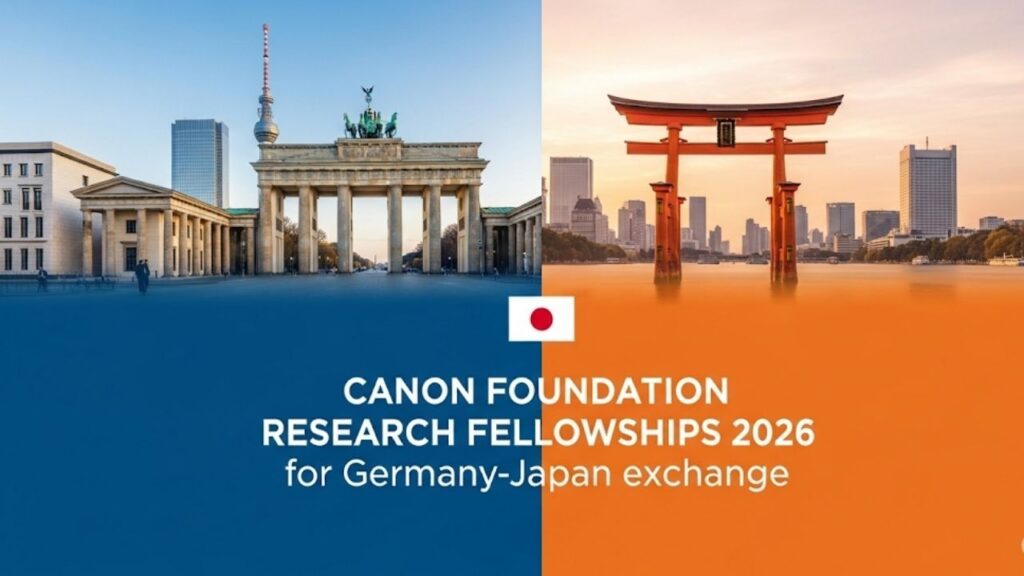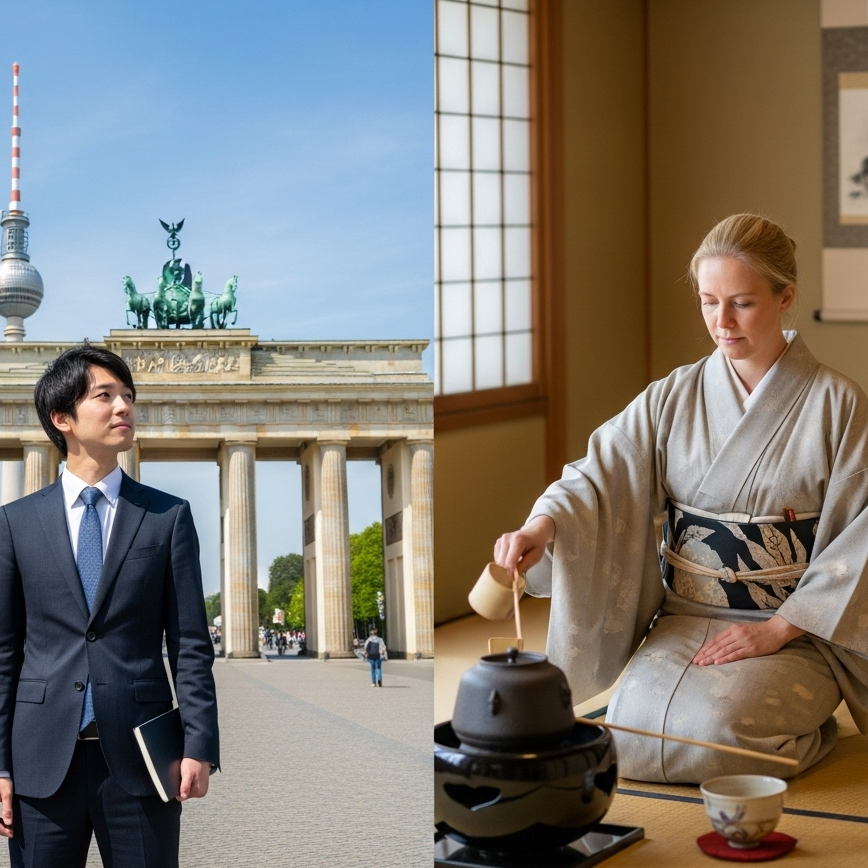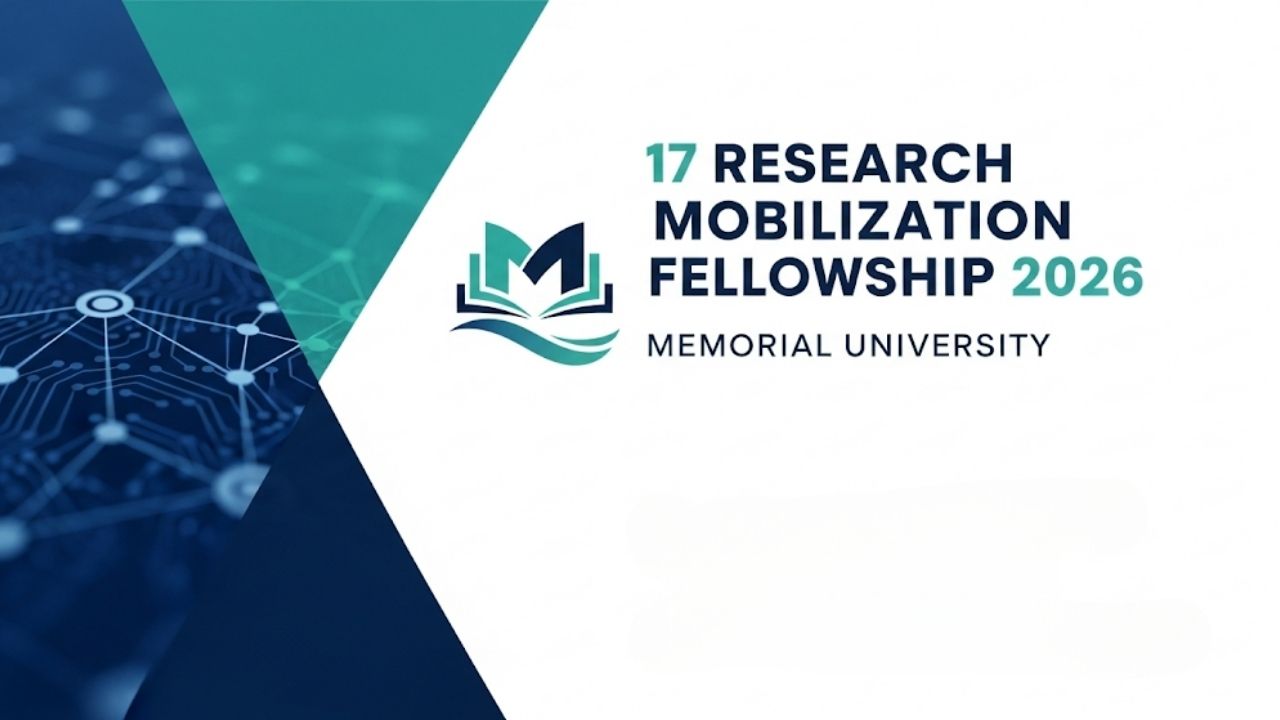Embarking on a Canon Foundation Research Fellowships 2026 application is the first step on a remarkable journey of intellectual and cultural discovery between Europe and Japan. If you are a brilliant researcher in Germany, or anywhere in Europe, dreaming of a research stint in Japan, or a Japanese scholar eager to collaborate with leading minds in Germany, you’ve come to the right place. This guide is designed to be your trusted companion, transforming a potentially complex process into a clear, manageable, and exciting path. We’ll break down everything you need to know, from eligibility to crafting a winning proposal, ensuring you feel confident and inspired to seize this life-changing opportunity.

This fellowship is more than just funding; it’s a prestigious gateway to building lasting international collaborations and deepening the mutual understanding between two of the world’s most innovative regions. Let’s start this journey together.
Canon Foundation Research Fellowships 2026
| Key Fact | Detail | Source |
| Application Deadline | 15 September 2025 (for 2026 intake) | Canon Foundation Official Website |
| Eligibility | Europeans (for research in Japan) & Japanese nationals (for research in Europe) | Canon Foundation Official Website |
| Fields of Research | All fields are supported. No restrictions. | Canon Foundation Official Website |
| Financial Support | Up to €30,000 per year (pro-rata for shorter periods) | Canon Foundation Official Website |
| Duration | 3 months to a maximum of one year | Canon Foundation Official Website |
Charting Your Course: Understanding the Canon Foundation’s Vision
Founded in 1987, the Canon Foundation in Europe has a noble and straightforward mission: to foster science, culture, and mutual understanding between Europe and Japan. Annually, it awards up to 15 fellowships to highly qualified researchers. This isn’t just about the science; it’s about the synergy created when different perspectives meet. For German researchers, this means unparalleled access to Japan’s cutting-edge laboratories and rich cultural archives. For Japanese scholars, it’s an invitation to join Germany’s world-renowned research institutions and vibrant academic communities.
The Foundation stands out for its flexibility. It supports all fields of research, from experimental physics and medical science to art history and sociology. This interdisciplinary approach enriches the network of fellows and alumni, creating a diverse and dynamic community that thrives on innovation.

Are You Eligible? Your Checklist for Success
Before you dive into the application, let’s ensure you meet the core requirements. The eligibility criteria are refreshingly direct.
For European Applicants (including Germany)
- You must be a national and permanent resident of a European country (this includes all EU countries, the UK, Switzerland, Norway, Israel, Turkey, and Balkan countries).
- You must hold a Master’s or PhD degree awarded within the last ten years.
- You are seeking to conduct research in Japan.
For Japanese Applicants:
- You must be a Japanese national.
- You must hold a Master’s or PhD degree awarded within the last ten years.
- You are seeking to conduct research in Europe (including Germany).
A key point highlighted by the Foundation is that priority is often given to applicants who will be traveling to Japan or Europe for the first time for a research project. This underscores their mission of fostering new connections. In my experience advising students, those who clearly articulate why a first-time research stay in the host country is critical for their project often have a compelling edge.
Don’t be discouraged if your degree is slightly older than ten years. The Foundation will consider your application if you provide a strong justification for the timeline, such as career breaks for family or other valid reasons.
The Application Journey: A Canon Foundation Research Fellowships 2026 Guide
Navigating the application process can feel like assembling a complex puzzle. Here’s how to put the pieces together seamlessly.
Step 1: The Cornerstone of Your Application – Finding a Host
This is the most crucial preliminary step. The Canon Foundation requires you to have an agreement with a host institution before you apply.
- For German Researchers: Your task is to identify a university or research institute in Japan that aligns perfectly with your research. Use academic databases, network at international conferences, and read recent publications to find leading researchers in your field. Be proactive and professional in your outreach. Personalize your emails, showing genuine interest in their work and clearly explaining how your research would be mutually beneficial.
- For Japanese Researchers: Germany’s research landscape is vast and welcoming. From the Max Planck and Fraunhofer Institutes to its globally-ranked universities (Technische Universität München, Ludwig-Maximilians-Universität München, Heidelberg University, etc.), your options are plentiful. The German Academic Exchange Service (DAAD) is an excellent resource for exploring potential host institutions.
Once you find a potential host, you need their official confirmation. This usually takes the form of a letter of invitation or a formal email agreement that you will include in your application.
Step 2: Crafting a World-Class Research Proposal
Your research plan is where you truly make your case. It needs to be clear, concise, and compelling. It should not only detail your project but also implicitly answer the question: “Why is this German-Japanese collaboration essential?”
Your proposal should include:
- A Clear Title and Abstract: Summarize your project’s essence in a few powerful sentences.
- Introduction and Research Question: What specific problem will you address? Why is it important?
- Methodology: How will you conduct your research? Be specific about the techniques, resources, and access you will need at the host institution.
- Timeline: Break down your research period (e.g., 6, 9, or 12 months) into logical phases.
- Expected Outcomes: What do you hope to achieve? This could be a publication, a new methodology, or the foundation for a larger international project.
- Synergy with Host: Explicitly state why your chosen host in Japan or Germany is the only or best place to conduct this research.
Step 3: Assembling Your Documents
With your host agreement and research proposal ready, it’s time to gather the remaining documents. According to the official application portal, you will typically need:
- The completed online application form.
- Your detailed research plan and a summary.
- Your Curriculum Vitae (CV).
- Two confidential letters of reference. Choose referees who know you and your work well.
- A copy of your highest degree (MA or PhD).
- The official letter of confirmation from your host institution.
- A passport photo.
Always double-check the website for the most current list of required documents before the 15 September 2025 deadline.
Life as a Canon Fellow: More Than Just Research
Winning the fellowship is the beginning of an incredible chapter. The financial stipend of up to €30,000 per year is flexible, allowing you to cover living costs, travel, insurance, and research expenses. This freedom empowers you to fully immerse yourself in your work and the local culture.
Imagine spending your weekends exploring the historic temples of Kyoto after a productive week in the lab, or discussing philosophy in a cozy Berlin café following a breakthrough in your archival research. This fellowship is designed to facilitate these holistic experiences.
I’ve seen many successful applicants thrive by embracing this cultural exchange. They don’t just stay in their academic bubble; they learn the language, engage with the community, and build friendships that last a lifetime.

The Foundation also fosters a strong alumni network. You’ll be connected with past fellows, creating a valuable professional and personal support system that extends far beyond your fellowship year.
Your Final Checklist Before Hitting ‘Submit’
As the deadline approaches, use this final checklist to ensure your application is polished and complete.
- Proofread everything. Typos and grammatical errors can detract from an otherwise brilliant proposal.
- Confirm your host agreement is clear and unconditional.
- Ensure your letters of reference have been submitted by your referees.
- Check that your research proposal clearly articulates the need for a Germany-Japan exchange.
- Verify all documents are in the correct format and uploaded successfully.
Your Future Awaits
The Canon Foundation Research Fellowships 2026 is a highly competitive program, with an average success rate of around 10%. But don’t let that statistic intimidate you. It should motivate you. Every year, dedicated researchers like you are selected because they present a vision that is not only academically sound but also aligns with the Foundation’s goal of building bridges.
Your Essential Guide: The UK Youth Mobility Scheme Ballot Opens Again in July 2025
FAQ
Q1: Do I need to speak Japanese or German to apply?
While proficiency in the local language is a great advantage for daily life, it is not always a strict requirement for the fellowship itself, especially if your research and work at the host institution will be conducted in English. However, showing a willingness to learn is always viewed positively.
Q2: Can I apply if I am still finishing my PhD?
Yes, you can apply. You should have obtained at least a Master’s degree. If you are a PhD candidate, you will need to provide evidence of your status and expected completion date.
Q3: Is the fellowship only for academics at universities?
No. According to the Canon Foundation’s guidelines, applications are also welcome from members of commercial, industrial, governmental, or professional organizations.
Q4: Can I choose any university in Germany or Japan?
Yes, you have the freedom to choose your host institution. The key is to find the best possible match for your research project and secure an agreement with them.










